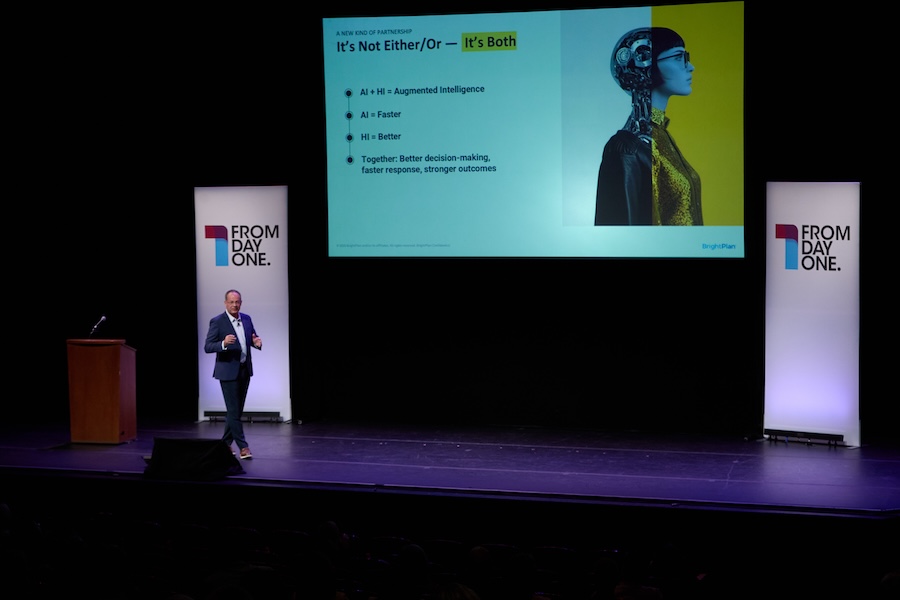How AI Innovation Can Unlock a New Era of Benefit Personalization for Employees


Recent surveys show that 93% of Gen Z employees use two or more AI tools weekly. Employees use AI to boost productivity, research benefits, strengthen managerial abilities, and build critical leadership skills. In this pivotal digital era, HR professionals have a unique opportunity to shape how AI is applied across industries.
“AI is becoming an integral part of your workforce, and it will increasingly be so over the years to come,” said Marthin De Beer, the founder and CEO of BrightPlan during a thought leadership spotlight at From Day One’s San Francisco conference. “So each and every one of us needs a strategy as to how we embrace that and how we implement that,” he said.
Beer presented a call-to-action, encouraging HR to “step up” by working with AI to personalize and effectively implement employee development in the session titled, “AI Innovation Unlocks a New Era of Benefit Personalization for Employees.”
AI as a People and Tech Opportunity
BrightPlan provides organizations with technology, education, and coaching for employee financial wellness. Its revenue quadrupled in 3 years of AI integration, says De Beer.
The company uses AI to combine employer compensation and benefit information with individual employees’ financial data. BrightPlan then provides hyper-personalized financial advice. Employees receive advice on spending, budgeting, debt management, investing, retirement planning, estate planning, and more.
BrightPlan’s exclusive access to comprehensive data combined with human-driven, empathetic guidance is “key for driving benefits optimization and ensuring the business is making investments in initiatives backed by tangible workforce needs,” De Beer said. The results support the finding that financial wellness is a top benefit concern in the workplace.
As employees’ financial wellness scores doubled within 6 months under BrightPlan’s coaching, according to its research, engagement improved by 59% and retention by 30%.
HI (human intelligence) and AI (artificial intelligence) must work in tandem. HR leaders play a crucial role in providing training and human oversight to ensure AI output reflects empathy, accuracy, and compliance. “You can literally ask it anything, from ‘can I afford a Ford Mustang’ to ‘my dad just passed away, what should I do? Or what benefits should I select for me?’” As a result, AI coaching can now address about 90% of employee needs, including benefits-related questions.

While AI can process static data quickly and efficiently, HR leaders are now being called to the forefront of AI transformation. Their focus will increasingly center on integrating people strategies with technological innovation. Beer notes that AI lacks human social, ethical, and emotional intelligence—making human oversight an essential part of AI training and implementation.
“You already own culture, policy, and ethics. You need that for AI. It’s becoming part of your workforce. You already guide how people work. Right now, you can help guide how AI works with them,” he said.
The Call-To-Action
Modern AI integration undeniably delivers effective, personalized benefits for both clients and employees. It brings continuous innovation that drives productivity and efficiency. As a result, HR’s role is expanding beyond its traditional scope.
De Beer emphasizes that a more people-centered approach is essential to enhance personalization, improving both the employee experience and the overall lifecycle. So, how can organizations begin to realize the full potential of this pivotal era in the workforce?
First, experiment with AI by taking classes or practicing ChatGPT to create presentations or strategies. The incentive is getting more done than ever before. Next, build a culture of ethical and empowered AI usage. De Beer suggests considering your company’s goals for AI applications and the potential circumstances surrounding them. “Use AI with purpose. Understand the context of what is being asked for when it comes to AI,” he said.
Finally, establish clear policies, training, and oversight, covering several crucial aspects. This includes limiting AI hallucinations, using feedback loops to generate code for engineers, producing RFP responses for sales teams, and ensuring HR leaders monitor AI output to provide contextually aware and financially responsible guidance.
BrightPlan’s AI coach is reviewed and improved weekly, De Beer says. This ensures that strict guardrails and creativity controls minimize hallucinations. “We've talked about the future of work for a long time. This is the future of work. AI is faster, HI is better, and it will keep getting better as it innovates together.”
Editor's note: From Day One thanks our partner, BrightPlan, for sponsoring this thought leadership spotlight.
Stephanie Reed is a freelance news, marketing, and content writer. Much of her work features small business owners throughout diverse industries. She is passionate about promoting small, ethical, and eco-conscious businesses
(Photos by David Coe for From Day One)
The From Day One Newsletter is a monthly roundup of articles, features, and editorials on innovative ways for companies to forge stronger relationships with their employees, customers, and communities.